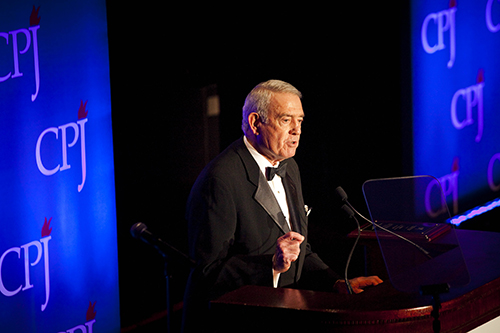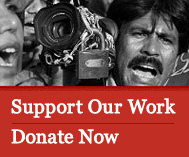
Dan Rather is an icon of American journalism and was one of CPJ’s earliest supporters. Rather served on CPJ’s board of directors for nearly 30 years and recruited CBS colleague Walter Cronkite, who became CPJ’s honorary chairman. In 2011, Rather began serving CPJ as a senior adviser.
“Frankly, we would not exist if not for Dan Rather,” CPJ’s executive director, Joel Simon, has said.
In his more than 60 years of reporting the news, Rather has remained a champion of watchdog journalism. The former anchor and managing editor of “The CBS Evening News”–for a record 24 years–and correspondent for “60 Minutes” has received virtually every honor in broadcast journalism.
Now, in a new book published in December, called Lessons from the field: Everything I learned about life I learned from reporting, Rather reflects on his personal and professional goals, dreams, and beliefs and explores the importance of compassion, humility, and gratitude. He also includes a series of questions in the book, so that readers can themselves begin to examine their own lives.
“From early childhood, I dreamt of being a reporter,” Rather writes in the book. “In the Depression years of the 1930s in Houston Heights, Texas, being a reporter meant being a print reporter. My dream was to be a bylined reporter for the Houston Chronicle, the Houston Press, or the Houston Post. That was as far as my vision could see at that time. That was my North Star.
“Have a navigational star and envision yourself moving toward it,” he says. “Then you can … try for the impossible dream.”
Lessons from the Field is being sold exclusively by the MindBodyNetwork, an online self-help community of news and experts in health, fitness, and wellness. All the proceeds from his book are being donated to CPJ. You can order a copy by clicking here.
CPJ spoke to Rather about the organization’s early years, his time at CBS News, and the importance of press freedom. This interview has been edited and condensed for clarity.
CPJ: You were one of CPJ’s original supporters. How did you hear about the organization?
DR: I had been named the anchor and managing editor of “CBS Evening News” in 1980 but I wasn’t actually to take the chair until 1981. I was succeeding the rightfully legendary Walter Cronkite. And somebody–it may have been president of the news division, at that time, a man named Bill Leonard–said something about how there was an effort to start to help journalists.
So my ears perked up at that and I looked at him and said, “What is this I’m hearing about?” and he said, “Well, they’re young and they’re idealistic, but here’s what they want to do.”
So I called Laurie [Nadel, another of CPJ’s early supporters], who was working for CBS News at that time, and she explained that they had started the idea but hadn’t gotten very far with it. We talked about it and I told her, “You know what, I’ll help if I could.”
It’s a far cry from where they are today. I’m so proud of CPJ now. … I don’t think anyone imagined it would become what it did become today.
CPJ: What was your role in that, in the first few years and after? What kind of work did you do?
DR: Through the early years it was really ad hoc. If they needed something, I tried to help. Sometimes it was a telephone call, sometimes it was money. There were sometimes calls of the sort that you would do now on a regular basis, like journalists in trouble and so on in faraway places and call the ambassador or call the consulate or maybe write a letter.
Sometimes I’d make a phone call to other journalists, sometimes I’d call to pave the way for someone at CPJ to come see them. I couldn’t sell heat to Eskimos, so I never sold anybody anything. But I’d just say, “There’s an organization that I’m part of, they’d like to come see you,” and, journalists being journalists, sometimes they’d say, “Why’re they coming to see me? Do they need money?” And I’d say, “Well, honestly, if you have any money. …” [Laughs.]
CPJ: You worked at CBS News for a record number of years. What was it like when you started?
DR: I was at CBS News for 44 years, but I was an anchorman at CBS news for 24. I loved every minute of it. I loved the people. CBS News was and still is what should be a treasured national institution. The whole time I was there I was so lucky. When I first came, I walked with legends–certified, bona fide, testified legends.
Edward R. Murrow, who was the founding saint of electronic journalism, instilled this sense of ethos, but CBS News was the mother church of that. It was a place in which every correspondent sought to believe and was taught to believe he or she was a kind of knight of the journalistic round table. … Now some people may laugh at that–the point is, we believed it. Everyone there believed it.
It was dedicated actions, but mixed with that was a belief that you had a big public trust. No one took you to class, no one said, “This is what it is.” You were taught by example that CBS News is a public trust and so one needs to be emotionally involved in the responsibilities of meeting that trust. And fortunately it emanated from the very top, from the top of the corporation. … It came right from the top down and the bottom up, this belief in the public trust and the responsibilities of that trust. It permeated the place.
I remember the first day that I walked in. I had been a reporter when I came there for 12 years–I thought I was a pretty good reporter, thought I was a pretty good writer. The second day I was there, I was given some scripts of various correspondents. And it was a humbling experience. I realized in a way I’ve got to raise my game quite a bit–I’m not nearly as damn good as I think I am. [Laughs.]
CPJ: You’ve said that having a free and open press is vital in order to uphold human rights. Why?
DR: In my opinion, press freedom has been shrinking–the concept–from its high-water mark maybe in the mid ’70s. It’s been shrinking both domestically within the United States and globally. It hasn’t been that long ago that places that didn’t have press freedom aspired to it. And some places, out of this country, that had some forms of press freedom, aspired to have more. That’s what I think I’m recognizing, that the concept of press freedom–it’s gotten a little muddied up, fogged up.
A free and independent press–fiercely independent, if necessary–is the red beating heart of freedom and democracy. That’s what I mean when I say things have gotten fogged up–that truth can’t be repeated too often. It’s the very heart of the whole concept of freedom for individuals, and freedom for a society.
It’s one reason I’m so happy to still be involved as I can with CPJ, because that was the heart of founding CPJ.
Rather was honored in 2011 with CPJ’s Burton Benjamin Award for lifetime achievement in the cause for press freedom. Read his acceptance speech here.
